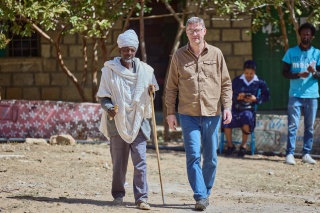
Lenten lessons from Tigray, Ethiopia
Easter reflection from Magnus MacFarlane-Barrow, Founder of Mary's Meals
Strange as it might sound, my recent visit to Tigray in northern Ethiopia not only provided me with deeply shocking first-hand information about the magnitude of the human catastrophe occurring there, but it also felt like a disturbing, unexpected, spiritual exercise.
Several situations that I encountered in the midst of an unfolding famine could be described as a ‘living hell’. The 220 people I met who have been living in one former classroom for three years since fleeing their homes during the war are crying out, literally, for a new life. Their days are now spent begging for food on the streets with plastic bags. In recent weeks, many who used to extend generosity to them have now become beggars themselves. The classroom resembles a chaotic, overcrowded field hospital more than a school, with people suffering all kinds of serious ailments – as malnourished people are bound to do, especially when living in impossibly crowded conditions without adequate sanitation. Seven have already died of hunger.
There are around 1 million internally displaced people living like this in camps, unable to return home since the war. And across the region, around 4.5 million people are in urgent need of food aid. Even doctors and former business owners now know how it feels to experience acute hunger and watch their own children suffer the same. Of course, their suffering is not limited to their current situation and deprivation. Nearly all of them are traumatised by the atrocities they experienced and witnessed during the recent war, and grieving the loss of loved ones.

The people of Tigray are a deeply religious people; 96% are Christian Orthodox and belong to one of the most ancient Christian communities in the world. What I learnt in these days was that their faith has not only led them over many centuries to carve world famous rock churches into the rugged cliffs above their stony fields, but it has shaped them and their hearts very deeply too.
Whilst I heard countless stories of indiscriminate executions, rape, and the burning of crops and homes during the war, I never once heard an angry or bitter word – no talk of revenge. Instead, over and over, I heard Tigrayans say ‘all we want is peace and to have peace we need to forgive’. When I asked them how they could possibly forgive all that had been done to them, I felt like I had asked a silly question in the face of their replies: ‘I am Christian. Of course, I have to forgive. I need to do it for me – not just for them – so that we can have peace’.
It became clear, too, that many thousands more people in Tigray would be dying of hunger if it were not for the profound acts of charity taking place. The idea of sharing everything you have in times of need seems so ingrained in these communities. No-one parades as a hero as they share the little food they have even while going hungry themselves. Again, in this place, that seems to be just a thing that Christians do without question.
For someone who has, once again, made a bad job of Lent, I felt like the people I met in Tigray were showing me how the three pillars of Lenten practice (prayer, almsgiving, and penance) can be practised even whilst living through devastating circumstances and dealing with the ever-growing threat of famine. Even the third of those pillars, penance – being endured as suffering imposed rather than chosen – was given meaning.
‘This suffering that goes on and on – we need to give it to God,’ a lady told me. And everywhere I saw people kneeling outside churches and wayside shrines in prayer.

And then I had a little glimpse of the joy and hope of Easter ahead of time; in schools where we are serving Mary’s Meals, I entered a different world. Children laughing as they jostled in line for their daily meal. Schools crowded with happy pupils, unlike those without school meals now abandoned by children who are looking for their next meal elsewhere. Life. Transformation. Hope. All of these and more served in each of our meals.
I have never met a people suffering more acutely than our brothers and sisters in Tigray. This Easter I hope and pray that somehow their agony might be relieved. That the international human family might notice their plight and take action to prevent a large-scale famine. I pray, please God, the people of Tigray soon have the chance to show us how to live the joy of Easter too.


